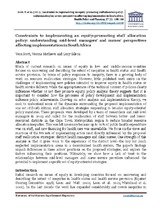| dc.contributor.author | Scott, Vera | |
| dc.contributor.author | Mathews, Verona | |
| dc.contributor.author | Gilson, Lucy | |
| dc.date.accessioned | 2014-02-25T20:08:58Z | |
| dc.date.available | 2014-02-25T20:08:58Z | |
| dc.date.issued | 2012 | |
| dc.identifier.citation | Scott, V. et al. (2011). Constraints to implementing an equity-promoting staff allocation policy: understanding key actors perspectives affecting implementation in South Africa.
Health Policy and Planning, 27 (2): 138-146 | en_US |
| dc.identifier.issn | 0268-1080 | |
| dc.identifier.uri | http://hdl.handle.net/10566/1039 | |
| dc.identifier.uri | http://dx.doi.org/10.1093/heapol/czr020 | |
| dc.description.abstract | Much of current research on issues of equity in low- and middle-income
countries focuses on uncovering and describing the extent of inequities in health
status and health service provision. In terms of policy responses to inequity,
there is a growing body of work on resource reallocation strategies. However,
little published work exists on the challenges of implementing new policies
intended to improve equity in health status or health service delivery. While the
appropriateness of the technical content of policies clearly influences whether or
not they promote equity, policy analysis theory suggests that it is important to
consider how the processes of policy development and implementation influence
policy achievements.
Drawing on actor analysis and implementation theory, we seek to understand
some of the dynamics surrounding the proposed implementation of one set of
South African staff allocation strategies responding to broader equity-oriented
policy mandates. These proposals were developed by a team of researchers and
mid-level managers in 2003 and called for the reallocation of staff between
better- and lesser-resourced districts in the Cape Town Metropolitan region to
reduce broader resource allocation inequities. This was felt necessary because up
to 70% of public health expenditure was on staff, and new financing for health
care was unavailable.
We focus on the views and reactions of the two sets of implementing actors most
directly influenced by the proposed staff reallocation strategies: district health
managers and clinic nurses. One strength of this analysis is that it gives voice to
the experience of the district level—the key but much neglected implementation
arena in a decentralized health system. The paper’s findings unpack differences in
these actors’ positions on the proposed strategies, and explore the factors
influencing their positions. Ultimately, we show how a lack of trust in the
relationships between mid-level managers and nurse service providers influenced
the potential to implement a specific set of equity-oriented strategies | en_US |
| dc.language.iso | en | en_US |
| dc.publisher | Oxford University Press | en_US |
| dc.rights | Copyright Oxford University Press. | |
| dc.source.uri | http://dx.doi.org/10.1093/heapol/czr020 | |
| dc.subject | Human resources | en_US |
| dc.subject | Equity | en_US |
| dc.subject | District health system | en_US |
| dc.title | Constraints to implementing an equity-promoting staff allocation policy: understanding key actors perspectives affecting implementation in South Africa | en_US |
| dc.type | Article | en_US |
| dc.privacy.showsubmitter | false | |
| dc.status.ispeerreviewed | true | |
| dc.description.accreditation | Web of Science | en_US |

